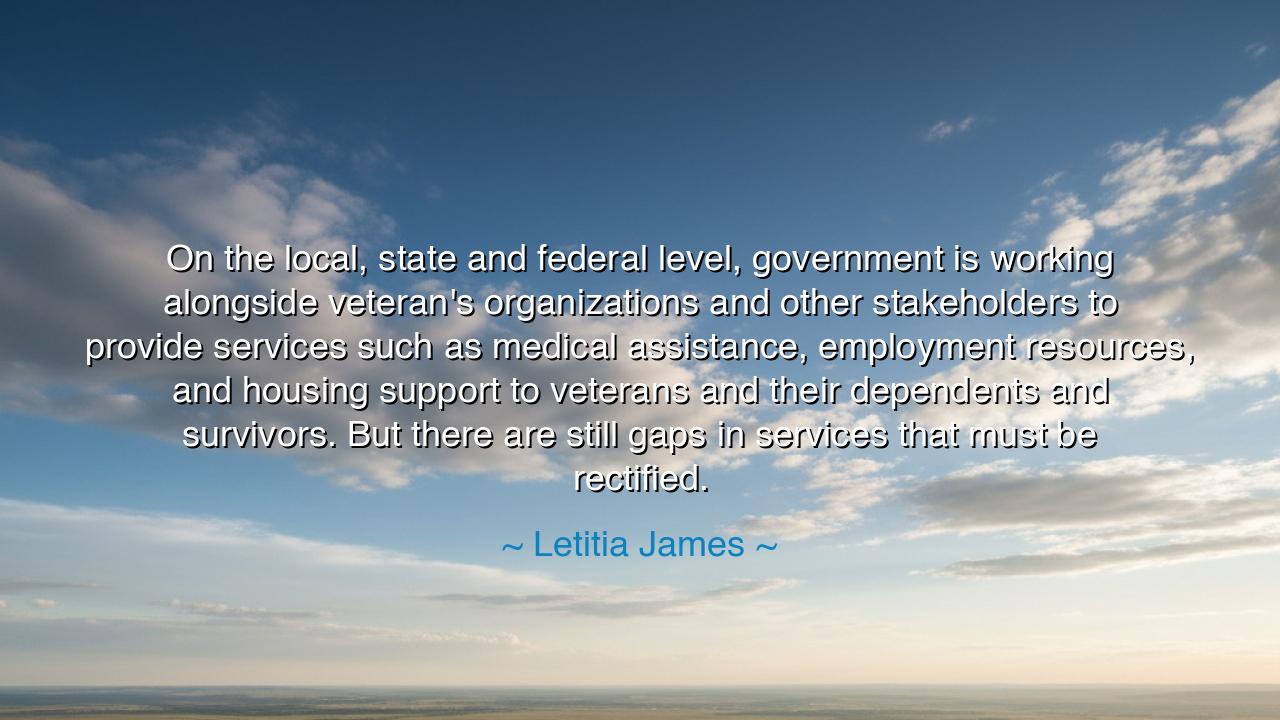
On the local, state and federal level, government is working
On the local, state and federal level, government is working alongside veteran's organizations and other stakeholders to provide services such as medical assistance, employment resources, and housing support to veterans and their dependents and survivors. But there are still gaps in services that must be rectified.






“On the local, state, and federal level, government is working alongside veteran’s organizations and other stakeholders to provide services such as medical assistance, employment resources, and housing support to veterans and their dependents and survivors. But there are still gaps in services that must be rectified.”
Thus spoke Letitia James, Attorney General and public servant, in words that blend gratitude with warning — a call both to remembrance and to action. Her voice rises not only as an acknowledgment of progress, but as a plea to confront the unfinished work that lies before us. In her statement echoes the ancient truth that duty does not end when battle ceases, and that the debt owed to those who have borne the burden of war is one that must be paid not with words, but with justice.
The origin of her words lies in the enduring struggle of nations to care for their veterans — the men and women who once stood as shields between peace and chaos, who risked their lives so that others might live freely. Throughout history, the return of the warrior has tested the conscience of civilizations. Ancient Rome, though it celebrated its soldiers, too often neglected them once their swords were sheathed. Many veterans, impoverished and forgotten, filled the streets of the empire they had defended. In time, the neglect of those who fought became a wound upon the nation itself. So too, Letitia James reminds us, must modern societies guard against the same failing — for when a nation forgets its defenders, it begins to forget its own soul.
Her mention of medical assistance, employment, and housing speaks to the pillars of restoration. These are not gifts, but obligations, owed to those who have given their strength in service. For a veteran’s wounds are not only of the flesh, but of the spirit; they carry with them invisible burdens — trauma, loss, and dislocation. The true test of a people, therefore, is not in how it honors the dead, but in how it restores the living. It is not enough to build monuments or hold parades; one must build systems that heal, opportunities that dignify, and homes that shelter. Only then can a nation claim to have fulfilled its sacred promise to those who served it.
Yet James, in her wisdom, acknowledges that “there are still gaps in services that must be rectified.” Here she points to the unfinished tapestry of compassion. Though governments may act and organizations may strive, there remain cracks through which too many veterans fall — those without homes, those who suffer untreated wounds of mind and body, those whose families struggle in silence. Her words are not condemnation, but clarion call, reminding us that the work of justice is never complete. The fight for equity does not end with policy — it must live in the hearts of citizens who refuse to look away from those who once protected them.
There is a story from the annals of ancient Greece, of a warrior named Diomedes, who returned from the Trojan War to find that his kingdom no longer remembered him. The people he had fought for had moved on, and his deeds, once sung in glory, faded into dust. Disheartened, he left his homeland forever, a hero unhonored. So it is that nations fall not from the swords of their enemies, but from the forgetfulness of their own people. Letitia James, like a voice from the temple of justice, warns against this very forgetting. Her words demand vigilance, that we remember our veterans not in ceremony alone, but in the living structure of our care.
Her message also carries a moral universality — that the measure of a society’s greatness is found in its compassion for those who have sacrificed. Each generation inherits the responsibility to rectify the gaps left by the one before. To do less is to betray not only the soldier, but the very ideals for which they fought. When the state falters in its duty, it is the people who must rise to fill the void: through advocacy, service, and remembrance. For justice, as the ancients knew, is not an institution, but a living flame that must be tended by all.
Therefore, the lesson of Letitia James’ words is both solemn and stirring: that gratitude must take form as action, and respect must be translated into care. Let each citizen, hearing her call, ask — What have I done for those who bore the weight of my peace? Support the organizations that aid veterans. Offer your time, your skills, your empathy. Hold leaders accountable to the promises made in the name of freedom. For when a nation honors its protectors with tangible compassion, it fortifies its own spirit.
And so, may these words endure as both remembrance and vow: that the warrior shall never be forgotten once the war is over; that healing shall walk hand in hand with honor; and that the measure of our civilization will be known by how we lift those who once stood in our defense. Letitia James reminds us that gratitude, though noble, is not enough — it must become action. Only then shall the gaps be closed, and the nation truly worthy of those who gave it their all.






AAdministratorAdministrator
Welcome, honored guests. Please leave a comment, we will respond soon